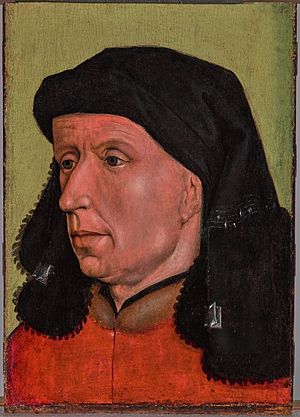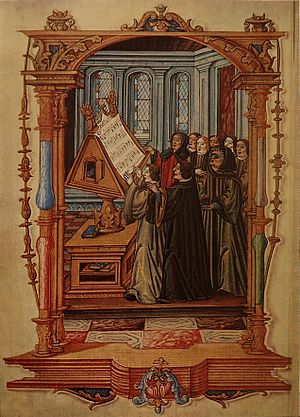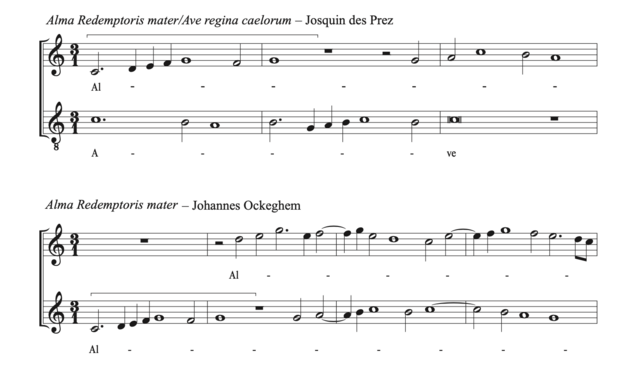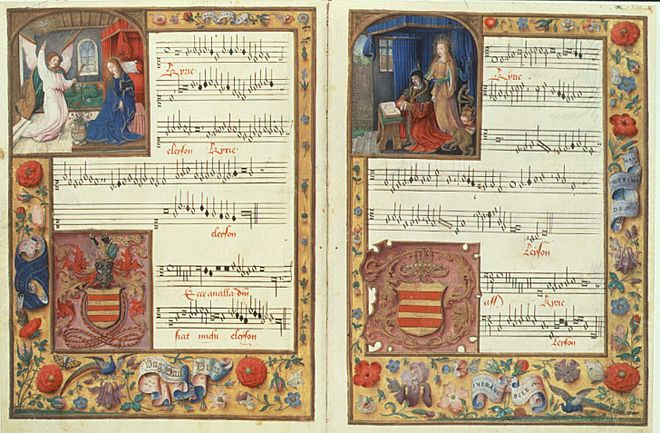Johannes Ockeghem facts for kids
Quick facts for kids
Johannes Ockeghem
|
|
|---|---|

Possible posthumous portrait of Ockeghem
|
|
| Born | c. 1410 Saint-Ghislain, Bavaria-Straubing
|
| Died | 6 February 1497 (aged 87) |
| Occupation |
|
|
Notable work
|
List of compositions |
Johannes Ockeghem (born around 1410 – died February 6, 1497) was an important composer and singer from the early Renaissance period. He was from the area known as Franco-Flemish, which is now parts of France, Belgium, and the Netherlands.
Ockeghem was one of the most influential European composers between the time of Guillaume Du Fay and Josquin des Prez. Along with his friend Antoine Busnois, he was a leading composer in the second half of the 1400s. He played a big part in the early Franco-Flemish School of music.
Ockeghem knew many other famous composers of his time. He spent most of his career working for the French kings. He served King Charles VII, King Louis XI, and King Charles VIII. When he died, many poets and musicians wrote sad songs and poems about him. These included famous people like Erasmus and Josquin des Prez, who wrote the well-known song Nymphes des bois for him.
Even though he was very famous, we only have a small number of Ockeghem's musical works today. These include about 14 masses, 20 chansons (French songs), and fewer than 10 motets (religious choral pieces). The exact numbers can be tricky because sometimes it's hard to be sure if a piece was truly written by him. Some of his most famous works are the Missa prolationum, which uses clever musical canons. Another is the Missa cuiusvis toni, which can be sung in any musical mode. He also wrote the chanson Fors seulement and the oldest surviving polyphonic (many-voiced) Requiem mass.
Contents
Life of Johannes Ockeghem
Early Life and Background
The way Ockeghem's name is spelled comes from a document from 1885. This document was thought to be written by him, but it has since been lost. In documents from the 1400s, his name was usually spelled "Okeghem." Other spellings also existed.
Most people believe Ockeghem was born in Saint-Ghislain. This city is in a region called Wallonia, which is now part of Belgium. We don't know his exact birth year. Some think he was born as early as 1410, while others suggest as late as 1430. The earlier date is supported by a poem written after his death. In this poem, the writer Guillaume Crétin said it was a shame Ockeghem died before he was 100 years old.
In 1993, old papers from 1607 were found. These papers confirmed that "Jan Hocquegam" was from Saint-Ghislain. This means he likely spoke Picard, a language from that region. Before this discovery, many thought he was from East Flanders.
We don't know much about Ockeghem's very early life. Like many composers of his time, he probably started as a choir singer. He might have learned music in a church school in a town like Mons. The first official record of Ockeghem is from June 1443. He was working as a "left-hand choir singer" at the Onze-Lieve-Vrouwe cathedral in Antwerp. "Left-handers" sang complex composed music. This church was very important, and it's likely he learned about English music styles there.
Musical Training and Career
Ockeghem likely studied with Gilles Binchois, another famous composer. They were close at the Burgundian court. Antoine Busnois wrote a motet honoring Ockeghem before 1467, so they probably knew each other too. Writers of the time often mentioned Ockeghem alongside Dufay and Busnois. Even though Ockeghem's music sounded different from older composers, he learned his basic skills from them. He was a direct link from the Burgundian style to the next generation of composers, like Obrecht and Josquin.
Between 1446 and 1448, Ockeghem worked for Charles I, Duke of Bourbon in Moulins, France. He was the first among the singing chaplains mentioned in the court records. Around 1452, he moved to Paris. There, he became the music director for the French royal court. He also worked as a treasurer at a church in Tours. He served both King Charles VII and King Louis XI. He also held positions at Notre-Dame de Paris and St. Benoît.
In 1470, Ockeghem traveled to Spain. This trip was part of a diplomatic mission for the King of France. The goal was to stop Spain from joining an alliance against France. It also aimed to arrange a marriage for the King's brother. After King Louis XI died in 1483, we don't know much about where Ockeghem was. We know he visited Bruges and Tours. He likely died in Tours, as he left his will there. Many laments were written when he died on February 6, 1497. One of the most famous is Josquin des Prez's Nymphes des bois.
Ockeghem's Music and Influence
Ockeghem did not write a huge amount of music, especially considering his long career. Some of his works have also been lost over time. Many pieces once thought to be by him are now believed to be by other composers. Today, we can reliably say about 14 masses (including a Requiem), five motets, and 21 chansons are his. His Missa pro Defunctis is the oldest surviving polyphonic Requiem mass.
Many of Ockeghem's masses are found in the Chigi codex. This is a beautiful manuscript from around 1500. Some of his works were also included in Harmonice Musices Odhecaton (1501). This was the first collection of music ever printed using movable type.
It's hard to know exactly when Ockeghem wrote his pieces. One helpful clue is the death of Binchois in 1460. Ockeghem wrote a special motet-chanson for him. His Missa Caput is probably an early work. This is because it is similar to an English mass from the 1440s. His later masses might include Missa Ma maistresse and Missa Fors seulement. These show his new ways of using a cantus firmus (a main melody) and his smoother musical textures.
Ockeghem used the cantus firmus technique in about half of his masses. In his earliest masses, he used "head-motifs" at the start of each section. This was common around 1440 but became old-fashioned by 1450. Three of his masses, Missa Ma maistresse, Missa Fors seulement, and Missa Mi-mi, are based on his own chansons. They use more than one voice from the original song. This was an early example of the "parody mass" style that became popular later. In his other masses, like the Missa cuiusvis toni and Missa prolationum, no borrowed music has been found. These pieces seem to be completely original.
Sometimes, Ockeghem would put the borrowed melody in the lowest voice. He did this in the Missa Caput. This mass is one of three written in the mid-1400s based on a chant from England. Ockeghem also made sure each voice in his music had its own rhythm. This helped keep them separate and interesting.
Ockeghem greatly influenced Josquin des Prez and the next generation of composers. He was known across Europe for his emotional music. He was also famous for his amazing technical skills. Two of the most impressive contrapuntal (music with multiple independent melodies) works of the 1400s are his. These are the Missa prolationum, which is made entirely of complex canons. The other is the Missa cuiusvis toni, which can be played in any musical mode. Even these technically difficult pieces show his unique way of using vocal ranges and musical sounds. Ockeghem's use of wide-ranging and active bass lines made him stand out. This might be because he himself had a deep voice.
List of compositions
- Masses
- Missa sine nomine (for 3 voices, attribution uncertain)
- Missa sine nomine (for 5 voices, incomplete)
- Missa Au travail suis (for 4 voices)
- Missa Caput
- Missa cuiusvis toni
- Missa De plus en plus
- Missa Ecce ancilla Domini
- Missa Fors seulement (for 5 voices, incomplete)
- Missa L'homme armé (for 4 voices)
- Missa Ma maistresse (incomplete)
- Missa Mi-mi (for 4 voices, also called Missa quarti toni)
- Missa prolationum (for 4 voices, around 1470)
- Missa quinti toni (for 3 voices)
- Missa pro defunctis (Requiem) (for 4 voices, incomplete, possibly for Charles VII's funeral in 1461)
- Credo sine nomine (Mass section, also called Credo "De village")
- Motets
- Marian antiphons (songs to the Virgin Mary)
- Alma Redemptoris Mater
- Ave Maria
- Salve Regina
- Other Motets
- Intemerata Dei mater (for 5 voices, possibly written 1487)
- Ut heremita solus (possibly for instruments)
- Deo gratias (for 36 voices, attribution uncertain)
- Gaude Maria (attribution uncertain)
- Motet-chanson
- Mort tu as navré/Miserere (a sad song for the death of Gilles Binchois, probably written in 1460)
- Chansons (French songs)
- Two voices
- O rosa bella (ballata) (Ai lasso mi – possibly by John Bedyngham or John Dunstaple?)
- Three voices
- Aultre Venus estes
- Au travail suis (attribution uncertain, possibly by Barbingant)
- Baisiés moy dont fort
- D'ung aultre amer
- Fors seulement contre
- Fors seulement l'attente
- Il ne m'en chault plus
- La despourveue et la bannie
- L'autre d'antan
- Les desléaux ont la saison
- Ma bouche rit
- Ma maistresse
- Prenez sur moi
- Presque transi
- Quant de vous seul
- Qu'es mi vida preguntays
- Se vostre cuer eslongne
- Tant fuz gentement resjouy
- Ung aultre l'a
- Three or four voices
- J'en ay dueil
- Four voices
- S'elle m'amera/Petite camusette
Recordings
- Flemish Masters, Virginia Arts Recordings, VA-04413, performed by Zephyrus. Includes Ockeghem's Alma Redemptoris mater and other composers.
- Angelus, Virginia Arts Recordings, VA-00338, performed by Zephyrus. Includes Ockeghem's Ave Maria ... benedicta tu and other composers.
- "Missa Cuiusvis Toni", æon, ÆCD 0753 (2 CDs-2007), performed by Ensemble Musica Nova, Lucien Kandel. This is the first recording of all four versions.
- "Missa prolationum", agogique AGO 008, Ensemble Musica Nova, Lucien Kandel.
See also
 In Spanish: Johannes Ockeghem para niños
In Spanish: Johannes Ockeghem para niños
 | Kyle Baker |
 | Joseph Yoakum |
 | Laura Wheeler Waring |
 | Henry Ossawa Tanner |





